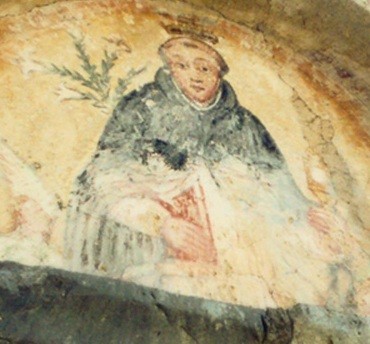Home > Thomas Aquinas > Biography
Thomas Aquinas’ biography
Saint Thomas Aquinas was born in 1224 or 1225 at Roccasecca. He recieves his first education at the abbey of Mount Cassino before studying the 7 liberal arts in Naples. After entering the Dominican order in 1244 he studies theology in Paris and Cologne. He teaches at the universities in Paris and Italy and dies on 7 March 1274.
Viewed from a political standpoint the fifty years of Aquinas’ life fall within the period of the rise and fall of the Hohenstaufen-empire. In 1220 Frederick II is crowned emperor. With this act a period begins of struggle between emperor and pope, of papal bans, and imperial battle against cities in Italy and against the nobles of the German countries. It is also the beginning of a period of government, in which Frederick designs a modern, centralistic, bureaucratic form of administration for the kingdom of Sicily. He also tries to import this form of administration elsewhere. During his government he is able to turn his court into a centre of culture and science, and he encourages strongly the natural sciences.
In his empire a unique contact between Jewish, Islamic, and Christian cultures establishes. Texts of a.o. Aristotle, Avicenna, Averroes are translated. In Naples he founds a university (studium) primarily for the training of future civil servants of the empire. When Frederick II dies in 1250 his son Konrad IV succeeds him to reign for three years. In the confusion of Konrad’s death and the struggle fought between the papal and imperial troops, Urban IV asks Charles of Anjou, brother of Louis IX of France for help. Charles becomes king of Naples and Sicily (1266) and beats the offspring of Frederick in the years thereafter.

Thomas’ family had connections with Frederick. The imperial party and the members of the family play an important role in the conflicts. Thomas is involved directly in these political and cultural developments on a number of occasions of his life. He studied at the university of Naples and because of that entered the intellectual world created by Frederick. Because of this he became acquainted with Aristotle and the commentaries of Avicenna and Averroes on Aristotle, while at the same time it was not allowed to study Aristotle’s complete philosophy at the other universities. At the end of his life he returns to Naples to teach at the same university.
Because of the frequent arousing battles between the pope and the emperor the popes were forced to reside outside of Rome. During the pontificate of Urban IV (1261-1265) the papal court resides from 1262 onwards mainly in Orvieto, where Thomas was appointed lecturer in the Dominican priory in 1261 by the provincial chapter. And so Thomas came to move in the ecclesiastical and church political circles by the choice of the pope to reside in Orvieto. Out of this a friendship sprang between the pope and Thomas, who, according to Thomas’ first biographer Ptolemeus of Lucca, ’did and wrote many things’ on the pope`s request.
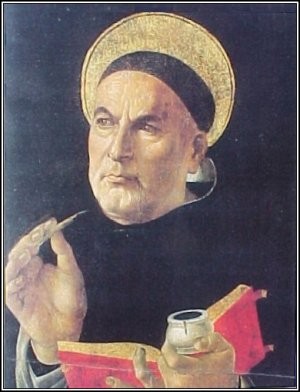
Urban IV, former patriarch of Jerusalem, wanted to make use of the opportunities the political situation in the Orient offered, to reunite the Orient and the West. Thomas was asked to examine theologically a compilation of Greek texts, and to write a commentary on the gospels. The first request resulted in the Contra errores Graecorum, which later was called the Catena aurea. Because of these enterprises Thomas gets acquainted with the ’Greek theology’, which will influence his theology deeply. A few years later Thomas is appointed lecturer at the priory at Viterbo by the provincial chapter, because the pope is present in Viterbo at that time. Also with this pope, Clement V, Thomas has a good relationship. This pope offers to appoint him archbishop of Naples, but Thomas refuses.
In Viterbo Thomas meets, among others, William of Moerbeke, a fellow Dominican, confessor of the pope. William is one of the most important translators of the Greek philosophers, and had reviewed existing translations (among others Aristotle’s Metaphysics). As it appears to be William has done translational and correctional work at the request of Thomas.
For Thomas’ life and work his choice to become a Dominican was more far-reaching than the major political developments. When Thomas enters the Dominican order in 1244, he becomes a member of a young order, founded by Dominic of Guzman in France in 1215 (acknowledged by the pope in 1216).
 As the official title of the order shows - ordo fratrum praedicatorum - it is a order of ’friars’, as was the mendicant order of the Franciscans. In this lies the first characteristic, because friars were no monks, nor secular priests. They criticise the rich and settled forms of religious life and are an answer to the new social economic relations. And, as the title of the order informs us, the goal of the order is the preaching in the broad sense, of publishing and teaching. For Dominic, the means for this goal was studying, ’the diligent study of the truth’, as the rule of the order formulates it. From the beginning Dominic sends his friars to the young university centres to study. Dominican houses were established in Bologna, Paris, Oxford and Montpellier. Here proper lecturers teach, who in many cases also teach at the university.
As the official title of the order shows - ordo fratrum praedicatorum - it is a order of ’friars’, as was the mendicant order of the Franciscans. In this lies the first characteristic, because friars were no monks, nor secular priests. They criticise the rich and settled forms of religious life and are an answer to the new social economic relations. And, as the title of the order informs us, the goal of the order is the preaching in the broad sense, of publishing and teaching. For Dominic, the means for this goal was studying, ’the diligent study of the truth’, as the rule of the order formulates it. From the beginning Dominic sends his friars to the young university centres to study. Dominican houses were established in Bologna, Paris, Oxford and Montpellier. Here proper lecturers teach, who in many cases also teach at the university.
When Thomas enters the Dominicans, he makes the choice for a new way of life. His decision gets an extra emphasis, because with it he runs counter to the plans of his parents. They had him predestined to become the abbot of the renowned abbey of the Benedictines of the Mount Cassino. In Paris Thomas makes his noviciate. When Albert the Great who was teaching in Paris, from the general chapter receives the instruction to start a studium generale of the Dominicans in Cologne, he takes Thomas with him. In Cologne Thomas attends Albert’s lectures, among which those about Denis’ De divinis nominibus and about Aristotle’s Nicomachean Ethics. Thomas also acts as Albert’s assistant (baccalaureus).
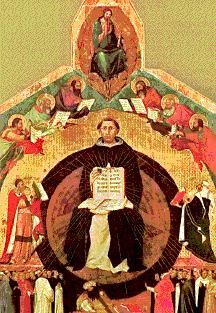
Despite his young age (27) Thomas is sent back to Paris in 1252 on Albert’s urgencies, to prepare himself for his masters in theology, so that he can occupy one of the two Dominican chairs at the university in Paris. From 1252 to 1259 Thomas remains in Paris. These are the years of the antimendicant controversy in the Paris Faculty. In earlier years the secular masters had become very annoyed with the fact that three chairs were occupied with Mendicants: one Franciscan, two Dominicans. Besides the jealousy for the success of the Friars as well for the level of their education as for the number of students and masters, and besides objections against having organisations within organisations, there was a general resistance against the mendicant orders. Because of the privileges they had received from the pope, the mendicant orders could work independently from the bishop, and were seen as instruments for papal politics and influencing. Therefore the resistance is not limited to the university: also the French bishops resisted against the mendicant orders.
During the first four years in Paris Aquinas works as sententiarius at St. Jacques’ Priory, meaning that he lectures on Peter of Lombard’s Sentences, which results in Thomas’ Scriptum super Sententiarum magistri Petri Lombardi. At the request of his fellow friars at this time he also writes De ente et essentia. In the spring of 1256 Thomas accepts the grade of Master (magister). Together with the Franciscan Bonaventure only a year and a half later he is admitted to the consortium magistrorum, which implies acceptation of the other masters of the university.
As ’master in Sacra Pagina’ Aquinas has three official tasks: lecturing, disputing and preaching. The lecturing relates to the reading out, analysing and explaining of the holy Scripture. Reading and explaining the Scripture was the privilege of the master. Disputing relates to the public discussions a master had to undertake on several occasions during the course of a year. The subjects were determined by the master. In Paris it was custom to hold disputations during Advent and Lent. The third task of a master was to provide for the university preachings, i.e. to preach in front of the university community at pre-set times.

When Thomas’ successor to the Dominican chair receives the master grade, Thomas leaves for Italy, probably to Naples, to his ’own’ priory. In this period he finishes his Summa contra Gentiles, which he had begun in Paris. In the years 1259-1265 Thomas is appointed as lecturer in different priories and in 1265 he is ordered to open a studium in Rome (Santa Sabina). His task then is to give theology-education to the young Dominicans. Probably in this context he writes his commentary on Denis’ De divinis nominibus and begins to write the Summa Theologiae, which he writes for beginning students. One assumes that Thomas had tried to read the Sentences of Peter of Lombard in Rome with his students and that he had begun to revise his own commentary on the Sentences, but that this work appeared to be unsuitable for these students.
That is the reason for Thomas’ decision to write a book without unnecessary questions and arguments, without repetitions that evoke confusion and boredom: a book wherein the things of faith are presented shortly and clearly and wherein the order used fits the subject. After two years he, as is mentioned before, is appointed in the priory of Viterbo because the pope resides in Viterbo at that time.
In these years the differences against the Mendicants revive in Paris and in the Dominican order one is of the opinion that the two chairs in Paris ought to be occupied by important theologians. Thomas is called back and also for the other chair someone is called back who had occupied this chair before, Peter of Tarentaise, the later pope Innocent V.
The second period as functioning master in Paris lasts three years and a half: they are the most productive years of his life. In Paris he has at his disposal a staff of secretaries, to which he dictates sometimes about different subjects at the same time. Among others he continues his work on the Summa. In 1274 Thomas is called back again to Italy, despite efforts of the faculty of arts to keep him in Paris. The provincial chapter orders Thomas to found a studium generale, wherefore he himself can choose at will the place, persons and the number of students. Thomas chooses for Naples. There he is appointed at the university. In Naples he works on the third part of the Summa, on his commentaries on Aristotle - which he started in Paris - and he writes a commentary on the Psalms (1-54). Besides that he preaches a lot: in Lent 1273 he preaches every day in the Neapolitan language.
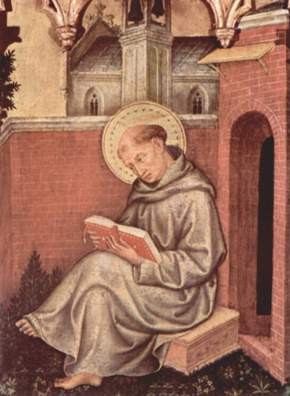
On December the 6th 1273 Thomas celebrates Mass in the morning (as he was used to do) and during this celebration something happens to him that changes him so he cannot continue with his theological effort: he stops writing and lecturing. Shortly after that Thomas is summoned to attend the ecumenical council held in Lyons, where the pope resides at that time. At the beginning of February 1274 Thomas leaves for Lyons. On the way an incident occurs: Thomas strikes his head against a low branch extending over the road. The injury appears to be more than superficial and the journey is interrupted. At the castle of Maenza, Thomas stays with his niece for some days, who lives there. He gets seriously ill. Towards the end of February he asks to be taken to a nearby abbey. Many witnesses heard him say: ’If the Lord is coming for me, I had better be found in a religious house than in a castle.’ He is taken to the Abbey of Fossanova and dies there on the 7th of March 1274.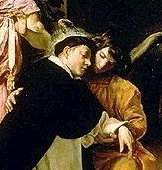
In the period following Thomas’ death the stories of people who knew him and had met him were gathered and written down, especially in connection with the inquiry for a possible canonisation that was begun in 1318. In these early biographies all kinds of stories and anecdotes are told to show something of the person and personality of Thomas: his great ability to concentrate, which made it possible for him to dictate to different secretaries on different subjects, the ability to lose himself in thought and contemplation so that he forgot his entourage and company, his devotion and zeal at the different aspects of his work, his interest in science and books, and his lack of interest in power and regard, his proficiency in disputing, his ease in preaching for the people. But all these stories remain at the outside so to speak: they give a hunch of something more that is not easily spoken of and of which Thomas was reserved even in his more personal utterances.
Most clearly these reservations can be seen in the events of the 6th of December 1273. When Reginald, his companion, asks why he had altered entirely his routine of the last years and had stopped writing, Thomas answers under insistence that he cannot, because all that he has written seems like straw to him. And when later Reginald returns to the subject and insists Thomas adds, urging not to reveal anything about this as long as he lived: ’Compared to what has now been revealed to me.’ As Thomas’ canonisation belongs to his biographical data, so also this practically inconceivable faithful centre of his life belongs to his theology and his doing theology.
Unauthorised translation of H.W.M. Rikhof, Over God spreken, 1988, pp.12-18
Eric Luijten, 1996
Viewed from a political standpoint the fifty years of Aquinas’ life fall within the period of the rise and fall of the Hohenstaufen-empire. In 1220 Frederick II is crowned emperor. With this act a period begins of struggle between emperor and pope, of papal bans, and imperial battle against cities in Italy and against the nobles of the German countries. It is also the beginning of a period of government, in which Frederick designs a modern, centralistic, bureaucratic form of administration for the kingdom of Sicily. He also tries to import this form of administration elsewhere. During his government he is able to turn his court into a centre of culture and science, and he encourages strongly the natural sciences.
In his empire a unique contact between Jewish, Islamic, and Christian cultures establishes. Texts of a.o. Aristotle, Avicenna, Averroes are translated. In Naples he founds a university (studium) primarily for the training of future civil servants of the empire. When Frederick II dies in 1250 his son Konrad IV succeeds him to reign for three years. In the confusion of Konrad’s death and the struggle fought between the papal and imperial troops, Urban IV asks Charles of Anjou, brother of Louis IX of France for help. Charles becomes king of Naples and Sicily (1266) and beats the offspring of Frederick in the years thereafter.

Thomas’ family had connections with Frederick. The imperial party and the members of the family play an important role in the conflicts. Thomas is involved directly in these political and cultural developments on a number of occasions of his life. He studied at the university of Naples and because of that entered the intellectual world created by Frederick. Because of this he became acquainted with Aristotle and the commentaries of Avicenna and Averroes on Aristotle, while at the same time it was not allowed to study Aristotle’s complete philosophy at the other universities. At the end of his life he returns to Naples to teach at the same university.
Because of the frequent arousing battles between the pope and the emperor the popes were forced to reside outside of Rome. During the pontificate of Urban IV (1261-1265) the papal court resides from 1262 onwards mainly in Orvieto, where Thomas was appointed lecturer in the Dominican priory in 1261 by the provincial chapter. And so Thomas came to move in the ecclesiastical and church political circles by the choice of the pope to reside in Orvieto. Out of this a friendship sprang between the pope and Thomas, who, according to Thomas’ first biographer Ptolemeus of Lucca, ’did and wrote many things’ on the pope`s request.

Urban IV, former patriarch of Jerusalem, wanted to make use of the opportunities the political situation in the Orient offered, to reunite the Orient and the West. Thomas was asked to examine theologically a compilation of Greek texts, and to write a commentary on the gospels. The first request resulted in the Contra errores Graecorum, which later was called the Catena aurea. Because of these enterprises Thomas gets acquainted with the ’Greek theology’, which will influence his theology deeply. A few years later Thomas is appointed lecturer at the priory at Viterbo by the provincial chapter, because the pope is present in Viterbo at that time. Also with this pope, Clement V, Thomas has a good relationship. This pope offers to appoint him archbishop of Naples, but Thomas refuses.
In Viterbo Thomas meets, among others, William of Moerbeke, a fellow Dominican, confessor of the pope. William is one of the most important translators of the Greek philosophers, and had reviewed existing translations (among others Aristotle’s Metaphysics). As it appears to be William has done translational and correctional work at the request of Thomas.
For Thomas’ life and work his choice to become a Dominican was more far-reaching than the major political developments. When Thomas enters the Dominican order in 1244, he becomes a member of a young order, founded by Dominic of Guzman in France in 1215 (acknowledged by the pope in 1216).
 As the official title of the order shows - ordo fratrum praedicatorum - it is a order of ’friars’, as was the mendicant order of the Franciscans. In this lies the first characteristic, because friars were no monks, nor secular priests. They criticise the rich and settled forms of religious life and are an answer to the new social economic relations. And, as the title of the order informs us, the goal of the order is the preaching in the broad sense, of publishing and teaching. For Dominic, the means for this goal was studying, ’the diligent study of the truth’, as the rule of the order formulates it. From the beginning Dominic sends his friars to the young university centres to study. Dominican houses were established in Bologna, Paris, Oxford and Montpellier. Here proper lecturers teach, who in many cases also teach at the university.
As the official title of the order shows - ordo fratrum praedicatorum - it is a order of ’friars’, as was the mendicant order of the Franciscans. In this lies the first characteristic, because friars were no monks, nor secular priests. They criticise the rich and settled forms of religious life and are an answer to the new social economic relations. And, as the title of the order informs us, the goal of the order is the preaching in the broad sense, of publishing and teaching. For Dominic, the means for this goal was studying, ’the diligent study of the truth’, as the rule of the order formulates it. From the beginning Dominic sends his friars to the young university centres to study. Dominican houses were established in Bologna, Paris, Oxford and Montpellier. Here proper lecturers teach, who in many cases also teach at the university.When Thomas enters the Dominicans, he makes the choice for a new way of life. His decision gets an extra emphasis, because with it he runs counter to the plans of his parents. They had him predestined to become the abbot of the renowned abbey of the Benedictines of the Mount Cassino. In Paris Thomas makes his noviciate. When Albert the Great who was teaching in Paris, from the general chapter receives the instruction to start a studium generale of the Dominicans in Cologne, he takes Thomas with him. In Cologne Thomas attends Albert’s lectures, among which those about Denis’ De divinis nominibus and about Aristotle’s Nicomachean Ethics. Thomas also acts as Albert’s assistant (baccalaureus).

Despite his young age (27) Thomas is sent back to Paris in 1252 on Albert’s urgencies, to prepare himself for his masters in theology, so that he can occupy one of the two Dominican chairs at the university in Paris. From 1252 to 1259 Thomas remains in Paris. These are the years of the antimendicant controversy in the Paris Faculty. In earlier years the secular masters had become very annoyed with the fact that three chairs were occupied with Mendicants: one Franciscan, two Dominicans. Besides the jealousy for the success of the Friars as well for the level of their education as for the number of students and masters, and besides objections against having organisations within organisations, there was a general resistance against the mendicant orders. Because of the privileges they had received from the pope, the mendicant orders could work independently from the bishop, and were seen as instruments for papal politics and influencing. Therefore the resistance is not limited to the university: also the French bishops resisted against the mendicant orders.
During the first four years in Paris Aquinas works as sententiarius at St. Jacques’ Priory, meaning that he lectures on Peter of Lombard’s Sentences, which results in Thomas’ Scriptum super Sententiarum magistri Petri Lombardi. At the request of his fellow friars at this time he also writes De ente et essentia. In the spring of 1256 Thomas accepts the grade of Master (magister). Together with the Franciscan Bonaventure only a year and a half later he is admitted to the consortium magistrorum, which implies acceptation of the other masters of the university.
As ’master in Sacra Pagina’ Aquinas has three official tasks: lecturing, disputing and preaching. The lecturing relates to the reading out, analysing and explaining of the holy Scripture. Reading and explaining the Scripture was the privilege of the master. Disputing relates to the public discussions a master had to undertake on several occasions during the course of a year. The subjects were determined by the master. In Paris it was custom to hold disputations during Advent and Lent. The third task of a master was to provide for the university preachings, i.e. to preach in front of the university community at pre-set times.

When Thomas’ successor to the Dominican chair receives the master grade, Thomas leaves for Italy, probably to Naples, to his ’own’ priory. In this period he finishes his Summa contra Gentiles, which he had begun in Paris. In the years 1259-1265 Thomas is appointed as lecturer in different priories and in 1265 he is ordered to open a studium in Rome (Santa Sabina). His task then is to give theology-education to the young Dominicans. Probably in this context he writes his commentary on Denis’ De divinis nominibus and begins to write the Summa Theologiae, which he writes for beginning students. One assumes that Thomas had tried to read the Sentences of Peter of Lombard in Rome with his students and that he had begun to revise his own commentary on the Sentences, but that this work appeared to be unsuitable for these students.
That is the reason for Thomas’ decision to write a book without unnecessary questions and arguments, without repetitions that evoke confusion and boredom: a book wherein the things of faith are presented shortly and clearly and wherein the order used fits the subject. After two years he, as is mentioned before, is appointed in the priory of Viterbo because the pope resides in Viterbo at that time.
In these years the differences against the Mendicants revive in Paris and in the Dominican order one is of the opinion that the two chairs in Paris ought to be occupied by important theologians. Thomas is called back and also for the other chair someone is called back who had occupied this chair before, Peter of Tarentaise, the later pope Innocent V.
The second period as functioning master in Paris lasts three years and a half: they are the most productive years of his life. In Paris he has at his disposal a staff of secretaries, to which he dictates sometimes about different subjects at the same time. Among others he continues his work on the Summa. In 1274 Thomas is called back again to Italy, despite efforts of the faculty of arts to keep him in Paris. The provincial chapter orders Thomas to found a studium generale, wherefore he himself can choose at will the place, persons and the number of students. Thomas chooses for Naples. There he is appointed at the university. In Naples he works on the third part of the Summa, on his commentaries on Aristotle - which he started in Paris - and he writes a commentary on the Psalms (1-54). Besides that he preaches a lot: in Lent 1273 he preaches every day in the Neapolitan language.

On December the 6th 1273 Thomas celebrates Mass in the morning (as he was used to do) and during this celebration something happens to him that changes him so he cannot continue with his theological effort: he stops writing and lecturing. Shortly after that Thomas is summoned to attend the ecumenical council held in Lyons, where the pope resides at that time. At the beginning of February 1274 Thomas leaves for Lyons. On the way an incident occurs: Thomas strikes his head against a low branch extending over the road. The injury appears to be more than superficial and the journey is interrupted. At the castle of Maenza, Thomas stays with his niece for some days, who lives there. He gets seriously ill. Towards the end of February he asks to be taken to a nearby abbey. Many witnesses heard him say: ’If the Lord is coming for me, I had better be found in a religious house than in a castle.’ He is taken to the Abbey of Fossanova and dies there on the 7th of March 1274.

In the period following Thomas’ death the stories of people who knew him and had met him were gathered and written down, especially in connection with the inquiry for a possible canonisation that was begun in 1318. In these early biographies all kinds of stories and anecdotes are told to show something of the person and personality of Thomas: his great ability to concentrate, which made it possible for him to dictate to different secretaries on different subjects, the ability to lose himself in thought and contemplation so that he forgot his entourage and company, his devotion and zeal at the different aspects of his work, his interest in science and books, and his lack of interest in power and regard, his proficiency in disputing, his ease in preaching for the people. But all these stories remain at the outside so to speak: they give a hunch of something more that is not easily spoken of and of which Thomas was reserved even in his more personal utterances.
Most clearly these reservations can be seen in the events of the 6th of December 1273. When Reginald, his companion, asks why he had altered entirely his routine of the last years and had stopped writing, Thomas answers under insistence that he cannot, because all that he has written seems like straw to him. And when later Reginald returns to the subject and insists Thomas adds, urging not to reveal anything about this as long as he lived: ’Compared to what has now been revealed to me.’ As Thomas’ canonisation belongs to his biographical data, so also this practically inconceivable faithful centre of his life belongs to his theology and his doing theology.
Unauthorised translation of H.W.M. Rikhof, Over God spreken, 1988, pp.12-18
Eric Luijten, 1996
